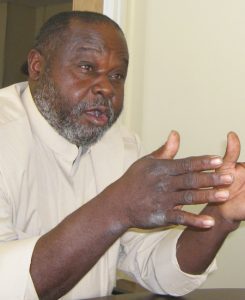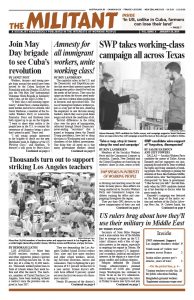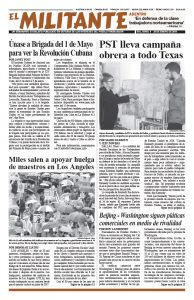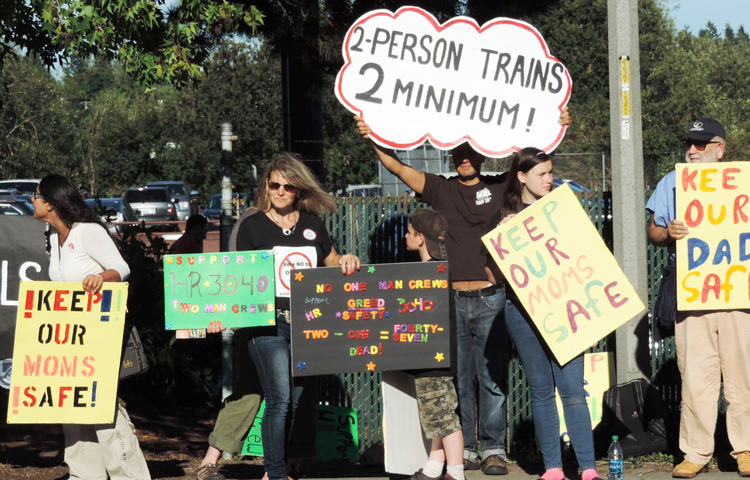In Defense of the US Working Class, a new book by Mary-Alice Waters, is now off the presses.
It features the talk by Waters at an April 24-26, 2018, international conference in Havana organized by the Cuban History Institute and the Central Organization of Cuban Workers (CTC), the country’s union federation.
Waters is a member of the Socialist Workers Party National Committee and president of Pathfinder Press, publisher of the book. Her talk was first printed in the June 11 issue of the Militant. She has edited her presentation for publication in the new book.
Waters’ talk was followed by a panel on the U.S. class struggle titled, “From Clinton to Trump: How US working people are responding to the anti-labor offensive of the bosses, their parties and their government.”
The panelists, leaders and supporters of the Socialist Workers Party with years of experience in industry and trade unions as well as on the land, explained how workers have fought back against the 40-year offensive by the employers and their government, Pathfinder editor Martín Koppel says in the book’s preface. “They pointed especially to the teachers strike in West Virginia and the impetus it gave to a wave of strikes and protests by school personnel in the spring of 2018 that swept Oklahoma, Kentucky, Arizona, and other states.”
In Defense of the US Working Class includes summaries of those remarks, as well as short biographies of the panelists. Last week the Militant printed those of Alyson Kennedy and Omari Musa. This week we feature the panel presentations by Willie Head and Jacob Perasso.
Copyright © 2019 by Pathfinder Press. Reprinted by permission.
❖
Willie Head. Willie is a longtime family farmer from south Georgia, a veteran of the century and a half of battles by farmers who are Black to keep their land. For twelve years he served as vice-president of the People’s Tribunal in Valdosta, Georgia, a community organization that fought to bring to justice a policeman who beat to death a prisoner in custody whose hands were tied behind his back. Like most small farmers in the US, throughout his life Willie has worked many nonfarm jobs, union and nonunion, to pay the bills and keep farming.

Head described the police violence and killings of African Americans in the rural South and the work of the Valdosta People’s Tribunal, which he called his “first frontline fight with the US court system.”
A century ago African American farmers owned more than 16 million acres of land in the US, he noted. Today that figure stands at 2.5 million acres. Head detailed the long court battle, begun in 1992, by more than twenty-five thousand farmers who are Black against the discrimination they face from banks, courts, and the federal government’s Department of Agriculture. All these forces bring pressure to bear on farmers who are Black to give up and sell their land. He described how a court ruling not only left farmers like himself who had “won” worse off than before, but also made them ineligible for any Department of Agriculture loans or assistance.
Head described the kinds of jobs he had worked to survive, including one that involved a daily drive of a hundred eighty miles round trip to northern Florida, returning each night to take care of his livestock and crops. “Yes, in the United States, unlike Cuba, farmers can lose their land,” he told conference participants. “Drawing from the Cuban people and this revolution has impacted me greatly.”
❖
Jacob Perasso. Jacob is a freight rail conductor and member of the SMART-TD union in one of the largest rail yards in the Northeast. He is a leader of the work of the Young Socialists in the US and internationally. He previously worked, among other jobs, in meatpacking plants in the Midwest, where he was involved in a number of union-organizing fights.

Perasso detailed the increasingly dangerous conditions in the rail industry, as bosses reduce crew sizes, extend workdays up to twelve hours, scrimp on training, and demand that workers cut corners on safety. He pointed to the 2013 train derailment in the small town of Lac Mégantic, Quebec, just north of the US-Canada border, where a train loaded with highly flammable petroleum cargo exploded, killing forty-seven people. Especially significant was the refusal of a jury of local residents to convict the two workers the rail company tried to blame for the accident. As evidence of bosses’ disregard for safety came out, townspeople had no doubt who was responsible.
Perasso described the system of bonuses, wage differentials, and other incentives the employers use to divide the workforce and get some workers to even help promote increasingly dangerous conditions on the job. Despite such pressures, freight rail workers voted down a contract in 2014 that would have allowed the bosses to begin running one-person train crews. That slowed but didn’t stop the owners’ offensive.
He pointed to the necessity to transform the unions in the course of struggles through which workers come to increasingly realize their own collective strength. “On the job we seek to explain the history that has brought the labor movement to where it is today,” Perasso said. “We explain the need to stop looking to the capitalist owners, their parties, their government, and their state. We need to chart a political course — a course of struggle — independent of them, defending the interests of the entire working class.”


